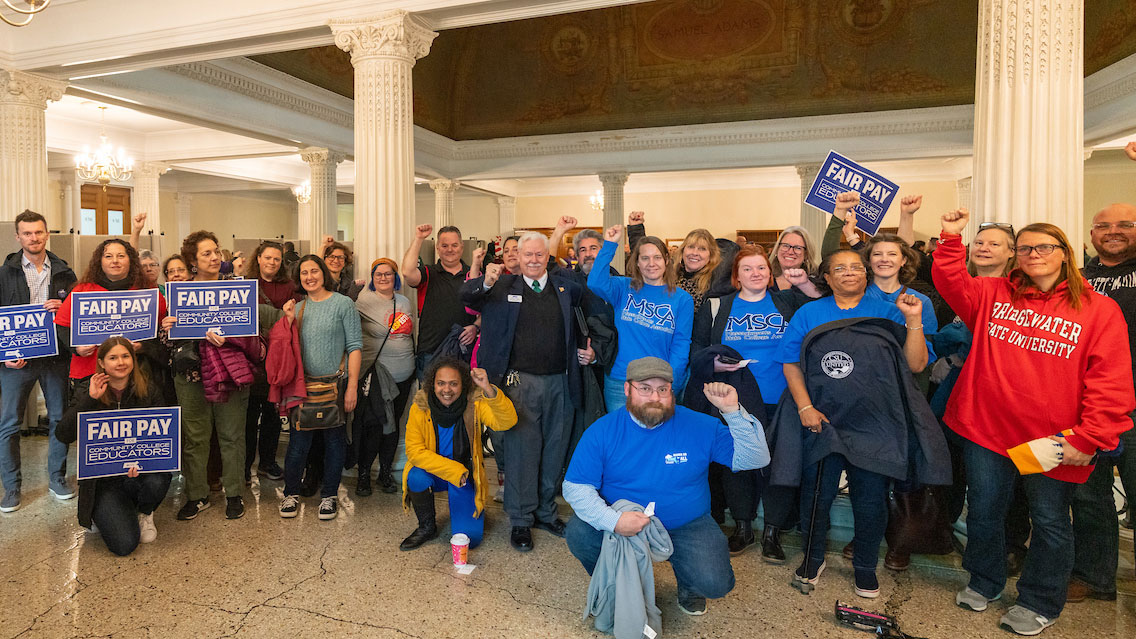MTA lauds union activism for state budget passage
MTA lauds union activism for state budget passage
MTA higher ed members called on legislators to "do your job" at an action at the State House on Nov. 20.
With contracts finally funded Monday afternoon after an infuriating delay that sparked widespread protest and activism among public-sector workers, members of the Massachusetts Teachers Association who work at public colleges and universities already are organizing next steps for public higher education spending.
“The solidarity of public-sector workers was beautiful to behold. Legislators felt the heat for their inexcusable inaction.”
MTA President Max Page
More than 50,000 public employees working in human services, health, education, and other areas had their pay unfairly frozen when lawmakers failed to pass a supplemental budget containing the funds for 95 contracts, most ratified more than six months ago. The fury was that lawmakers would go on holiday break, forcing workers and their families to wait until next year for negotiated pay adjustments.
MTA President Max Page said the pressure put on legislators by public-sector workers from multiple unions made it impossible for lawmakers to avoid acting on the supplemental budget, which was ensnared in a dispute over how to support families in need of shelter.
“Member activism was crucial to this finally getting done,” Page said. “Thousands of MTA members worked alongside colleagues from other unions making phone calls, sending emails, signing petitions, and showing up to events, both on their campuses and at the State House. The solidarity of public-sector workers was beautiful to behold. Legislators felt the heat for their inexcusable inaction.”
When the executive board of the AFL-CIO meets on Thursday, Page said, it will discuss what can be done in the future to avoid having workers’ cost-of-living raises tied up in political maneuvering unrelated to their contracts.
The dysfunction on Beacon Hill has been troubling to those affected by legislators’ inability to provide not only contract funding, but also aid to families in need of shelter.
Alexa MacPherson, president of the Classified Staff Union at UMass Boston, said she is already bracing for bargaining that begins in January. At a campus rally last week, workers from several unions at UMass Boston began their push to have Governor Maura Healey’s administration set higher wage parameters for bargaining that begins in January.
“Members are justifiably angry that it took lawmakers so long to fund our contracts.”
Classified Staff Union President Alexa MacPherson
“The members of the Classified Staff Union at UMass Boston, like all staff across the UMass system, have been doing their jobs, working through many difficult facets and challenges of the pandemic and beyond,” MacPherson said. “In many cases, we are the forward-facing, front line of the university system and for members to have to repeatedly call their legislators to remind them to do their job is simply unconscionable. Members are justifiably angry that it took lawmakers so long to fund our contracts.”
Beyond these contracts, MTA members are moving forward with their Higher Ed for All campaign to pass the Cherish Act, to achieve a generational investment in public higher education by making it truly debt free, recruiting and retaining outstanding staff and faculty with fair wages and working conditions, providing students with the supports they need to graduate, and building green and healthy buildings on our campuses. This can be accomplished by investing some of the Fair Share Amendment funds, which are estimated to generate close to $2 billion this year, and more in the future.
“This is not the end of the funding fight, but rather the beginning of a longer one for all of higher ed,” said Claudine Barnes, president of the Massachusetts Community College Council, which represents faculty and professional staff at community colleges across the state. MCCC members have warned the Healey administration that the state’s plans to attract more students to community colleges will require boosting wages.
“The pay at community colleges is too low to effectively attract and retain the faculty we need at community colleges, especially as our colleges are playing a major role in providing cost-free access to public higher education in the state,” Barnes said.
Maria Hegbloom, president of the Massachusetts State College Association, which represents faculty and librarians at state universities, likewise voiced frustration with the contract-funding delays. “The way that the Legislature tied up the funding of our contracts as part of internal political games being played on Beacon Hill has been unacceptable,” Hegbloom said. “Lawmakers’ actions have undermined those of us committed to working for the public good.”
Related News
- MTA statement on the Legislature’s supplemental budget failure
- Union News: Help Unfreeze 60K State Workers’ Contracts
- Take action now to fund higher education contracts
- A Thanksgiving Call To Action: Support Our Higher Ed Members
- Our higher ed members need our help
- MTA statement on Legislature’s failure to pass budget